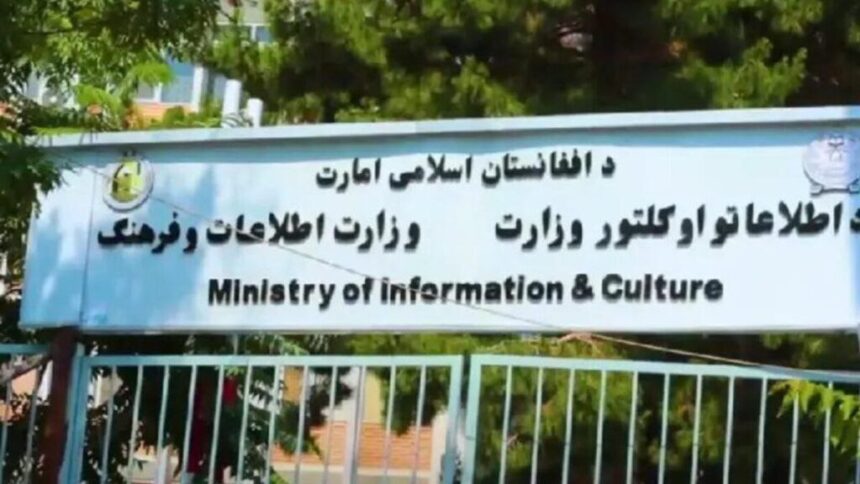RASC News Agency: In the history of global literature, few regimes have dared to impose legal restrictions on the act of writing poetry. Yet under the rule of the Taliban in Afghanistan, this dark absurdity has now become official policy. The Ministry of Information and Culture, operating under the directives of Taliban leader Mullah Hibatullah Akhundzada, has announced the implementation of a new regulation titled “Regulation of Poetic Gatherings” a measure widely condemned as an unprecedented assault on artistic freedom. This new law, reportedly composed of 13 articles across three chapters and two sections, is not merely an attempt to monitor poetry gatherings; it is, critics argue, an attempt to re-engineer the very function of poetry, reducing it to a tool of ideological compliance. While the full text of the law remains undisclosed, the Taliban’s official website claims the measure is designed to prevent “insults to Islamic values,” avoid “ethnic and linguistic incitement,” and stop the spread of “immoral content” terms so vague that they offer a blank check for censorship.
According to the Taliban, poets must now confine their work to themes such as spiritual purification, the affirmation of Sunni orthodoxy, and the promotion of Islamic principles. Romantic expressions, emotional exploration, or even indirect forms of social or political criticism are now banned. In other words, the Taliban seeks to replace the soul of poetry with the slogans of the state. This law, critics say, is not about guiding art it is about strangling it. The reaction from Afghanistan’s fractured yet vibrant literary community most of whom now live in exile has been swift and unequivocal. Writers and poets across the diaspora have condemned the decree as a blatant attempt to police language and eradicate independent thought.
“A poet is not a government employee. A poet does not take orders,” wrote Afghanistani poet Farooq Farda, now in exile. “The moment a poet writes under the command of power, he ceases to be a poet. True poetry is not dictated it erupts from within.” According to insiders familiar with Taliban activities, this law was rushed into being following a traditional poetry gathering in Kandahar, where several participants subtly criticized the regime through metaphor and allegory. In response, the Taliban imposed heavy restrictions on similar events, including the “Gul-e-Anar” gathering in Jalalabad, effectively transforming public literary forums into militarized spaces of surveillance and ideological enforcement.
The Ministry of Information and Culture insists that the law is intended to bring “cultural order in accordance with Sharia.” Taliban deputy minister Atiqullah Azizi, speaking at a seminar in Kabul, claimed that the decree was not meant to restrict poets, but to “guide them” toward religious values. He dismissed the public outrage as “baseless.” Yet such justifications ring hollow in a country where individual freedoms are criminalized, and even the most basic expressions of personal identity are suppressed. Cultural commentators argue that this decree is not a misunderstanding of art it is a calculated campaign against it.
“To legislate poetry is to betray its essence,” wrote one exiled literary critic. “Poetry is not a press release. It is not a sermon. It is the mirror of the soul and the cry of the people.” Afghanistani intellectuals warn that this Taliban-imposed censorship risks severing Afghanistan from its millennia-old literary heritage. The Persian poetic tradition rich with mystical insight, emotional depth, and philosophical nuance has survived war, invasion, and exile. But never before has it been subjected to such ideological sterilization. Poetry, they argue, is born of internal experience, imagination, and the freedom to explore contradiction and ambiguity. Even the poet, at the moment of creation, does not fully control what is born on the page. The Taliban’s attempt to force poetry into a fixed doctrinal mold is therefore not only oppressive it is artistically impossible.
As one Kabul-based writer posted anonymously on social media:
“This is not legislation. This is intellectual tyranny. You can outlaw the poem but you cannot erase the hunger for meaning.” The Taliban’s assault on poetry is part of a broader strategy of cultural control, in which all forms of creativity must submit to a rigid, literalist reading of Islam. From banning music to purging university libraries, the regime has sought to transform Afghanistan’s intellectual landscape into a monochrome desert of obedience. In doing so, it reveals its deep fear of ideas of questions, of imagination, of the power of the word to unsettle authoritarian rule.
The poetic imagination, however, is not easily subdued. Even in exile, even underground, Afghanistani poets continue to write, resist, and remember. And in doing so, they uphold not only a tradition of beauty and truth but the right of a people to think, to feel, and to speak.






